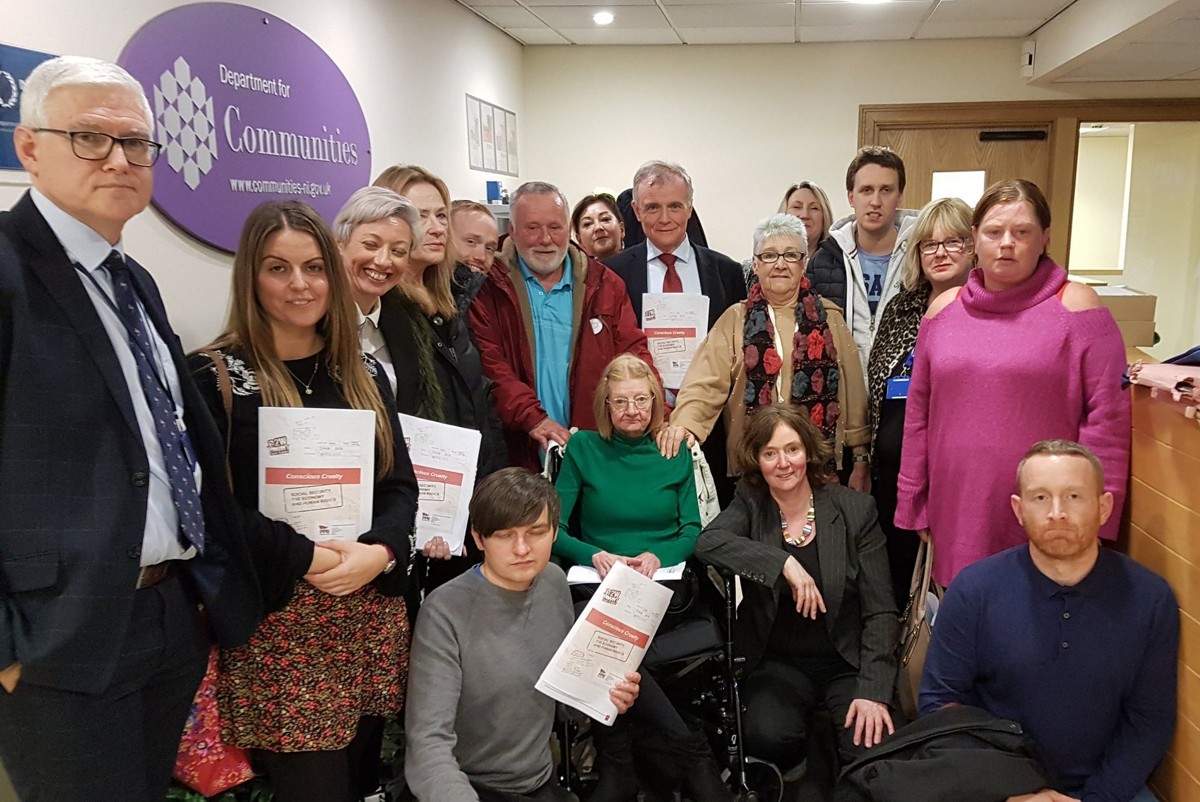It’s all just a little bit of history repeating (pt. 2)
Re-appointment of Capita raises more questions about the Department for Communities’ stated commitment to human rights
At the end of May, the UK Government announced that they were re-awarding the contract for social security assessments for Personal Independence Payment - financial support for disabled people – to Capita.
The decision flies in the face of common sense, decency and any regard for competence or value for public money. As we documented in our previous blog, Capita was one of the private companies whose treatment of disabled people and whose litany of errors should have barred them from ever being awarded public money again. This latest move ends any hope disabled people may have taken from statements by the former Minister for Communities that the assessment service could be brought back in house.
Among those with direct experience of Capita’s failings are members of PPR’s Right to Work Right to Welfare (R2W) group who have campaigned for a social security assessment process which respects people’s human rights, particularly the conditions set out in the Right to Social Security and the Right to an Adequate Standard of Living, both of which are part of the international law convention which the UK Government has agreed to abide by. R2W developed the ‘People’s Proposal’ as a simple checklist which could be used by the Department for Communities during social security assessments to guarantee people’s procedural rights and protections from extreme poverty were in place.
In 2020 at a meeting with the Minister for Communities, the R2W group received a commitment from the Minister to work together to pilot a human rights based approach. This Ministerial commitment was then ditched by senior civil servants in a follow up meeting. Officials refused to release the video record of the meeting and R2W were unable to secure a meeting with the latest Minister before the latest Stormont collapse.
In the meantime, what has changed for people who are being subjected to the ‘conscious cruelty’ of our social security system?
In three quarters of cases, advice workers anticipated that the applicant would have to go without the minimum essential level of income.
Last year, PPR worked with leading advice providers to find out whether disabled and unemployed people were experiencing a rights based system of assessment. They surveyed almost 200 people over a 6 week period and found that:
- Fewer than half of applicants were able to access specialist advice in relation to their social security claim;
- Almost 70% of people applying for PIP did not fully understand the assessment process;
- In three quarters of cases, advice workers anticipated that the applicant would have to go without the minimum essential level of income.
The Department for Communities ignored the report, its recommendations and all requests to meet.
PPR recently reported the substance of these findings and the Department’s response to the UN Committee on the Rights of Persons with Disabilities, as it continues to follow up on the UK’s progress in delivering the rights to social security, an adequate standard of living and independent living.

Image caption: Members of R2W meet with former Department of Communities Permanent Secretary and officials during the People’s Proposal campaign
Contrast these findings and numerous other reports with a recent letter received by PPR from the Department for Communities, in response to a social security appeal by a disabled man who has had his income stopped and reinstated numerous times in recent years after being subjected to flawed social security assessments. In that correspondence, we requested an update on the progress made to implement a human rights checklist. The Department responded:
“I wish to confirm the Department’s commitment to the Human Rights Act and I can assure you that Human Rights is embedded in everything we do. Since your last correspondence a comprehensive review of the checklist provided by PPR against departmental process has been completed. I can advise that the department considers that the approach outlined within the proposed checklist is already encompassed within the Department’s decision-making processes and the underpinning legislation. In many cases, the Department’s decision-making procedures go beyond the proposed checklist. I can also assure you that the Department will continue to engage with the Chief Executive of NI Human Rights Commission in all Human Rights matters.”
We were interested to understand the extent and nature of the review and contacted NIHRC to enquire about their role within it.
They responded as follows:
“The Human Rights Commission (the Commission) has had no formal role in the comprehensive review process. In April 2022 the Department requested a meeting to discuss a project to develop a human rights based approach across the Department. The Department has not engaged with the Commission since April 2022 on this matter. The Commission understands this is due to budgetary constraints and the absence of a Minister."
“The Commission has not provided any recommendations to the Department on this matter. The Commission’s 2022 Annual Statement made a number of targeted recommendations to the Department of Communities and to the UK Government regarding the right to an adequate standard of living and to social security. You can view these recommendations from page one 198 of the document here.”
"The Commission’s recommendations include: The Department of Work and Pensions should review the entitlement conditions and reverse the cuts in social security benefits introduced by the Welfare Reform Act 2012 and the Welfare Reform and Work Act 2016 to this end. In the interim, the Commission recommends that the Department for Communities, with support from the NI Executive, implements a comprehensive and secure mitigation package as long as necessary in NI. The Department has not responded to the Commission’s Annual Statement recommendations.”
If the Department For Communities were to submit itself to the same level of scrutiny that vulnerable and disabled people are being subjected to by Capita, how many points would they get?